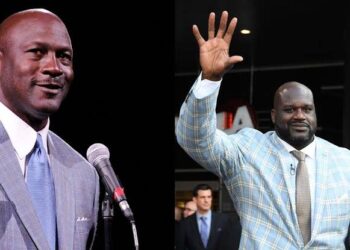Michael Jordan, the NBA legend, was always vocal about the fact that Scottie Pippen, his longtime teammate on the Chicago Bulls, was underpaid during their time together. Despite being a critical part of the Bulls’ success, Pippen’s salary never reflected his true value to the team. At his peak with the Bulls, Pippen’s highest salary was a modest $3.4 million during the 1992-93 season, a figure that paled in comparison to what he could have earned given his contributions.
Before the start of the 1995-96 NBA season, Jordan shared his concerns with Bulls reporter Cheryl Raye-Stout, expressing his frustration over Pippen’s financial situation. Jordan, who was earning millions off the court through endorsements, revealed that he wished there was a legal way for him to financially help Pippen, acknowledging that his teammate was grossly underpaid. He recalled how he, too, had been underpaid earlier in his career, but had decided to play through it, hoping that Pippen would be rewarded similarly once his contract expired.
Pippen had signed a seven-year contract worth $18 million in July 1991. Although this deal provided some financial security, Pippen likely left a lot of money on the table. His decision was driven by a need to provide for his family, making it difficult to risk holding out for a better deal later on. Bulls owner Jerry Reinsdorf and general manager Jerry Krause had the opportunity to renegotiate Pippen’s contract as he quickly outperformed it, becoming a superstar in his own right. However, they chose not to, leading to a strained relationship between Pippen and the Bulls’ management, particularly with Krause.
The tension between Pippen and Krause reached a breaking point before the 1997-98 season when Pippen discovered that Krause had attempted to trade him. Feeling disrespected, Pippen began openly criticizing Krause in front of the team. As a form of protest, Pippen delayed surgery on his injured ankle until the season started, a decision that further complicated his relationship with management.
By November 1997, Pippen publicly demanded a trade, stating that he wouldn’t return to play unless the Bulls traded him. His frustration was fueled not only by his contract situation but also by the knowledge that the Bulls’ dynasty was on the verge of breaking up. Phil Jackson, the team’s coach, was not expected to return, and Jordan was a free agent after the season. Despite Pippen’s demands, the Bulls didn’t trade him, and he eventually rejoined the team, making his season debut in January 1998.
Despite all the internal turmoil, the Bulls, led by Jordan, Pippen, and Dennis Rodman, managed to have another stellar season, winning 62 games and ultimately capturing their sixth NBA championship by defeating the Utah Jazz in the Finals. Jordan secured his sixth Finals MVP by averaging 33.5 points per game, solidifying his status as one of the greatest players of all time.
However, after the championship, the Bulls’ dynasty came to an abrupt end. With Jackson retiring and Jordan stepping away from the game, the Bulls traded Pippen to the Houston Rockets. As part of a sign-and-trade deal, Pippen signed a five-year, $67.2 million contract, finally receiving the kind of financial compensation he deserved.
Over his career, Pippen earned around $109 million in NBA salary, a figure that exceeded Jordan’s $93 million in on-court earnings. However, Jordan’s off-court ventures, particularly his lucrative Jordan brand, helped him amass a net worth of $3.2 billion, dwarfing Pippen’s earnings.
The way the Bulls dynasty ended remains a point of regret for many fans. While the team secured a sixth title in 1998, many believe they could have won a seventh in the 1998-99 season if not for the internal conflicts and management decisions that led to the break-up of one of the greatest teams in NBA history.









